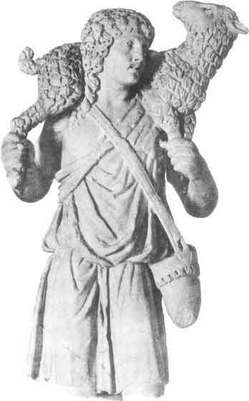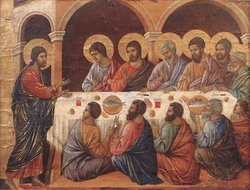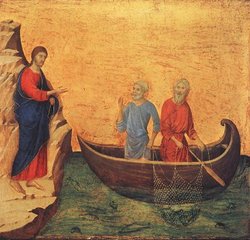 On the occasion of the next World Day of prayer for vocations to the priesthood and to the consecrated life, which will be celebrated on
On the occasion of the next World Day of prayer for vocations to the priesthood and to the consecrated life, which will be celebrated on
The vocation to the priesthood and to the consecrated life constitutes a special gift of God which becomes part of the great plan of love and salvation that God has for every man and woman and for the whole of humanity. The Apostle Paul, whom we remember in a special way during this Pauline Year dedicated to the Two-thousandth anniversary of his birth, writing to the Ephesians says, "Blessed be the God and Father of our Lord Jesus Christ, who has blessed us in Christ with every spiritual blessing in the heavenly places, even as he chose us in him before the foundation of the world, that we should be holy and blameless before him" (Ef 1:3-4). In the universal call to holiness, of particular relevance is God's initiative of choosing some to follow his Son Jesus Christ more closely, and to be his privileged ministers and witnesses. The divine Master personally called the Apostles "to be with him, and to be sent out to preach and have authority to cast out demons" (Mk
Our first duty, therefore, is to keep alive in families and in parishes, in movements and in apostolic associations, in religious communities and in all the sectors of diocesan life this appeal to the divine initiative with unceasing prayer. We must pray that the whole Christian people grows in its trust in God, convinced that the "Lord of the harvest" does not cease to ask some to place their entire existence freely at his service so as to work with him more closely in the mission of salvation. What is asked of those who are called, for their part, is careful listening and prudent discernment, a generous and willing adherence to the divine plan, and a serious study of the reality that is proper to the priestly and religious vocations, so as to be able to respond responsibly and with conviction.
The Catechism of the Catholic Church rightly reminds us that God's free initiative requires a free response on the part of men and women; a positive response which always presupposes acceptance of and identification with the plan that God has for everyone; a response which welcomes the Lord's loving initiative and becomes, for the one who is called, a binding moral imperative, an offering of thanksgiving to God and a total cooperation with the plan which God carries out in history (cf. n. 2062).
 Contemplating the mystery of the Eucharist, which expresses in a sublime way the free gift of the Father in the Person of his Only Begotten Son for the salvation of mankind, and the full and docile readiness of Christ to drink to the dregs the "cup" of the will of God (cf. Mt 26:39), we can more readily understand how "faith in the divine initiative" models and gives value to the "human response". In the Eucharist, that perfect gift which brings to fulfilment the plan of love for the redemption of the world, Jesus offers himself freely for the salvation of mankind. "The Church", my beloved predecessor John Paul II wrote, "has received the Eucharist from Christ her Lord not as a gift - however precious - among so many others, but as the gift par excellence, for it is the gift of himself, of his person in his sacred humanity, as well as the gift of his saving work" (Ecclesia de Eucharistia, 11).
Contemplating the mystery of the Eucharist, which expresses in a sublime way the free gift of the Father in the Person of his Only Begotten Son for the salvation of mankind, and the full and docile readiness of Christ to drink to the dregs the "cup" of the will of God (cf. Mt 26:39), we can more readily understand how "faith in the divine initiative" models and gives value to the "human response". In the Eucharist, that perfect gift which brings to fulfilment the plan of love for the redemption of the world, Jesus offers himself freely for the salvation of mankind. "The Church", my beloved predecessor John Paul II wrote, "has received the Eucharist from Christ her Lord not as a gift - however precious - among so many others, but as the gift par excellence, for it is the gift of himself, of his person in his sacred humanity, as well as the gift of his saving work" (Ecclesia de Eucharistia, 11).
It is priests who are called to perpetuate this salvific mystery from century to century until the Lord's glorious return, for they can contemplate, precisely in the Eucharistic Christ, the eminent model of a "vocational dialogue" between the free initiative of the Father and the faithful response of Christ. In the celebration of the Eucharist it is Christ himself who acts in those whom he chooses as his ministers; he supports them so that their response develops in a dimension of trust and gratitude that removes all fear, even when they experience more acutely their own weakness (cf. Rm 8:26-28), or indeed when the experience of misunderstanding or even of persecution is most bitter (cf. Rm 8:35-39).
The awareness of being saved by the love of Christ, which every Mass nourishes in the faithful and especially in priests, cannot but arouse within them a trusting self-abandonment to Christ who gave his life for us. To believe in the Lord and to accept his gift, therefore, leads us to entrust ourselves to Him with thankful hearts, adhering to his plan of salvation. When this does happen, the one who is "called" voluntarily leaves everything and submits himself to the teaching of the divine Master; hence a fruitful dialogue between God and man begins, a mysterious encounter between the love of the Lord who calls and the freedom of man who responds in love, hearing the words of Jesus echoing in his soul, "You did not choose me, but I chose you and appointed you that you should go and bear fruit and that your fruit should abide" (Jn 15:16).
This intertwining of love between the divine initiative and the human response is present also, in a wonderful way, in the vocation to the consecrated life. The Second Vatican Council recalls, "The evangelical counsels of chastity dedicated to God, poverty and obedience are based upon the words and examples of the Lord. They were further commanded by the apostles and Fathers of the Church, as well as by the doctors and pastors of souls. The counsels are a divine gift, which the Church received from its Lord and which it always safeguards with the help of His grace" (Lumen Gentium, 43).
Once more, Jesus is the model of complete and trusting adherence to the will of the Father, to whom every consecrated person must look. Attracted by him, from the very first centuries of Christianity, many men and women have left families, possessions, material riches and all that is humanly desirable in order to follow Christ generously and live the Gospel without compromise, which had become for them a school of deeply rooted holiness. Today too, many undertake this same demanding journey of evangelical perfection and realise their vocation in the profession of the evangelical counsels. The witness of these our brothers and sisters, in contemplative monasteries, religious institutes and congregations of apostolic life, reminds the people of God of "that mystery of the Kingdom of God is already at work in history, even as it awaits its full realization in heaven" (Vita Consecrata, 1).
 Who can consider himself worthy to approach the priestly ministry? Who can embrace the consecrated life relying only on his or her own human powers? Once again, it is useful to reiterate that the response of men and women to the divine call, whenever they are aware that it is God who takes the initiative and brings His plan of salvation to fulfilment, is never patterned after the timid self-interest of the worthless servant who, out of fear, hid the talent entrusted to him in the ground (cf. Mt 25:14-30), but rather expresses itself in a ready adherence to the Lord's invitation, as in the case of Peter who, trusting in the Lord' word, did not hesitate to let down the net once more even after having toiled all night and catching nothing (cf. Lk 5:5). Without in any sense renouncing personal responsibility, the free human response to God thus becomes "co-responsibility", responsibility in and with Christ, through the action of his Holy Spirit; it becomes communion with the One who makes it possible for us to bear much fruit (cf. Jn 15:5).
Who can consider himself worthy to approach the priestly ministry? Who can embrace the consecrated life relying only on his or her own human powers? Once again, it is useful to reiterate that the response of men and women to the divine call, whenever they are aware that it is God who takes the initiative and brings His plan of salvation to fulfilment, is never patterned after the timid self-interest of the worthless servant who, out of fear, hid the talent entrusted to him in the ground (cf. Mt 25:14-30), but rather expresses itself in a ready adherence to the Lord's invitation, as in the case of Peter who, trusting in the Lord' word, did not hesitate to let down the net once more even after having toiled all night and catching nothing (cf. Lk 5:5). Without in any sense renouncing personal responsibility, the free human response to God thus becomes "co-responsibility", responsibility in and with Christ, through the action of his Holy Spirit; it becomes communion with the One who makes it possible for us to bear much fruit (cf. Jn 15:5).
An emblematic human response, full of trust in God's initiative, is the generous and unmitigated "Amen" of the Virgin of Nazareth, uttered with humble and decisive adherence to the plan of the Most High announced to her by God's messenger (cf. Lk 1:38). Her prompt "Yes" allowed Her to become the Mother of God, the Mother of our Saviour. Mary, after this first "fiat", had to repeat it many times, even up to the culminating moment of the crucifixion of Jesus, when "standing by the cross of Jesus" as the Evangelist John notes, she participated in the dreadful suffering of her innocent Son. And it was from the cross, that Jesus, while dying, gave her to us as Mother and entrusted us to her as sons and daughters (cf. Jn 19:26-27); she is especially the Mother of priests and consecrated persons. I want to entrust to her all those who are aware of God's call to set out on the road of the ministerial priesthood or consecrated life.
Dear friends, do not become discouraged in the face of difficulties and doubts; trust in God and follow Jesus faithfully and you will be witnesses of the joy that flows from intimate union with him. Imitating the Virgin Mary whom all generations proclaim as blessed because she believed (cf. Lk 1:48), commit yourselves with every spiritual energy, to realise the heavenly Father's plan of salvation, cultivating in your heart, like her, the ability to be astonished and to adore him who is mighty and does "great things", for Holy is his name (cf. Lk 1:49).
From the
Benedictus PP. XVI


Leave a comment